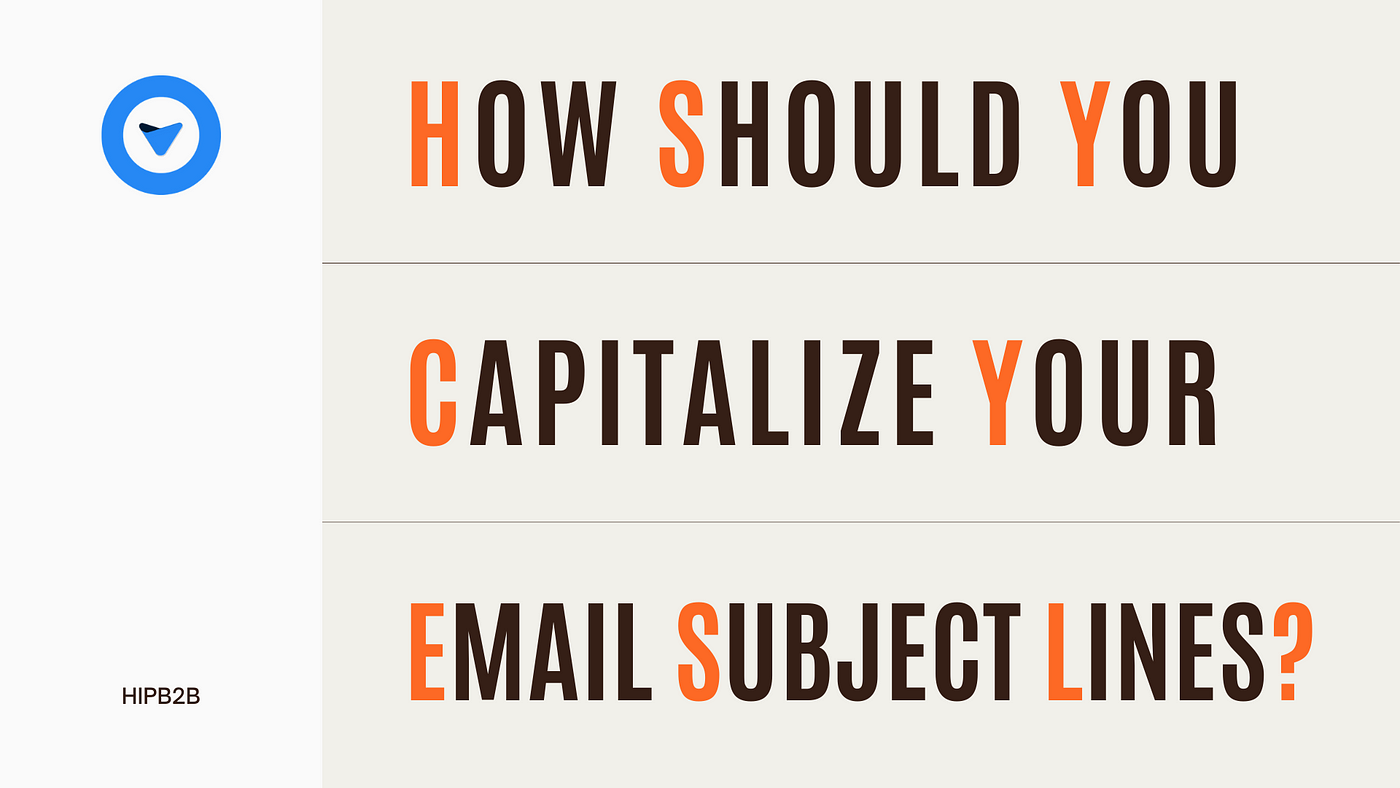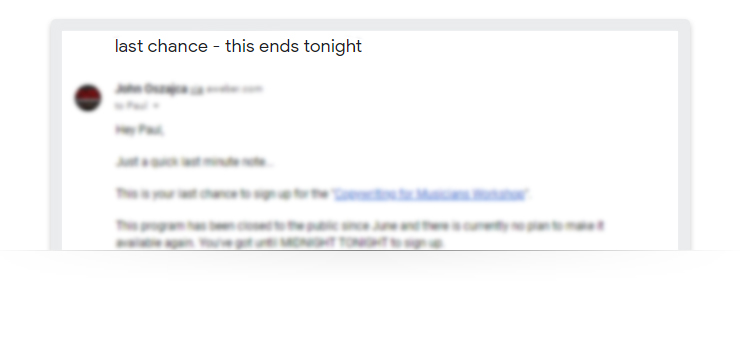Should Marketing Emails Subject Lines Be Capitalized?
Yes, capitalize marketing email subject lines. It’s clear and grabs attention.
Capitalization can make subject lines stand out in crowded inboxes. In the world of email marketing, subject lines are crucial. They are the first impression and determine whether an email gets opened or ignored. Capitalizing subject lines can enhance visibility and emphasize key words.
But it’s not just about being noticed. It’s also about conveying professionalism and clarity. Inconsistent capitalization can confuse recipients or make emails look unpolished. While there are no strict rules, many marketers find that capitalized subject lines achieve better engagement. They appear more authoritative and focused. So, understanding capitalization’s impact can lead to more effective communication. Let’s explore why this small detail matters in email marketing success.

Credit: glockapps.com
Importance Of Subject Lines
Subject lines are the gatekeepers of your email marketing campaigns. They hold the power to entice or deter your audience. Crafting an effective subject line is crucial because it can significantly impact your open rates. A well-thought-out subject line can make your email stand out in a crowded inbox. But should you capitalize your subject lines to make them more effective? Let’s dive into the importance of subject lines to understand their role.
Role In Email Campaigns
Subject lines play a pivotal role in the success of email campaigns. They are the first thing your recipients see, and they determine whether your email gets opened or ignored. Think of them as your email’s first impression. A subject line should convey the essence of your message clearly and concisely.
Consider how you react to emails in your own inbox. Do capitalized subject lines catch your eye more? Or do they seem too aggressive? Your audience might have similar reactions. The decision to capitalize should reflect the tone and style of your brand.
First Impression Impact
First impressions matter, especially in email marketing. Your subject line is like a handshake with your reader. It should be firm but not overpowering. Capitalization can make a subject line stand out, but it can also look like you’re shouting.
Imagine receiving an email with a subject line in all caps. Does it make you curious or does it feel like spam? Assess your audience’s preferences. Sometimes, a simple mix of uppercase and lowercase letters can make your subject line approachable yet attention-grabbing.
Ask yourself: how do you want your audience to feel when they read your subject line? Is capitalizing the right choice for your brand? Experiment with different styles and track your results. Your subject line is your first chance to connect with your reader, make it count!

Credit: hipb2b.medium.com
Capitalization Trends
In the dynamic world of email marketing, subject lines hold significant power. Their style, tone, and format can make or break an email’s success. Among these elements, capitalization stands out as a key focus. Marketers often wonder about the best capitalization trends. These trends can impact open rates and engagement levels.
Common Practices
Most marketers capitalize the first word in subject lines. Some use title case, capitalizing each word. Others prefer sentence case for a casual feel. Consistency is crucial. It builds brand recognition and sets expectations. Each style has its own effect on readers.
Industry Examples
Brands like Apple and Nike often use title case. Their subject lines appear formal and authoritative. On the other hand, BuzzFeed uses sentence case. This approach makes their emails feel friendly and approachable. These examples show how capitalization aligns with brand identity. Each strategy aims to capture the reader’s attention.
Psychological Effects
Subject lines play a crucial role in email marketing. They are the first impression a recipient gets. The way they are written can trigger various psychological effects. One major consideration is the capitalization of subject lines. It influences how recipients perceive and engage with the email. Let’s explore these psychological effects.
Perceived Professionalism
Capitalization can impact the perceived professionalism of an email. Many people see proper capitalization as a sign of respect. A subject line with correct capitalization looks polished and formal. It suggests that the sender pays attention to detail. In contrast, all lowercase subject lines may seem casual. They might imply a lack of effort or urgency.
Some brands use all caps to convey importance. This can be effective but also risky. All caps might appear as shouting to the reader. This can lead to a negative perception. Hence, balanced capitalization helps maintain professionalism.
Reader Engagement
Capitalization affects reader engagement significantly. A well-capitalized subject line captures attention. It guides the reader’s eye naturally. This can increase the open rates of the email. On the other hand, a poorly capitalized subject line can confuse readers. They might skip over it or delete it without opening.
Readers tend to engage more with well-structured subject lines. Proper capitalization enhances readability. It makes the subject line more inviting and approachable. Thus, thoughtful capitalization can enhance reader engagement.

Credit: blog.aweber.com
A/b Testing Insights
Exploring A/B testing insights can help determine if capitalizing email subject lines impacts open rates. Capitalized subject lines might catch attention or seem too aggressive. Testing reveals what resonates best with your audience, balancing clarity and engagement.
When crafting marketing emails, the subject line can make or break your campaign. But should it be capitalized? This is a question that many marketers face, and A/B testing can offer valuable insights. By experimenting with different capitalization styles, you can determine which approach resonates best with your audience.Testing Methods
To explore whether capitalized subject lines are more effective, you can conduct A/B tests. Start by splitting your email list into two groups. Send one group emails with capitalized subject lines and the other with lowercase subject lines. Keep everything else consistent. This way, you can be sure that any change in engagement is due to the capitalization. Track open rates and see which version catches more attention.Data-driven Decisions
Data should guide your email marketing strategies. By analyzing the results from your A/B tests, you can make informed decisions about subject line capitalization. If your data shows higher open rates for capitalized lines, consider adopting this style more broadly. However, if lowercase lines perform better, it might be worth sticking with a more casual approach. Remember, your audience’s preferences can change over time. Regularly test and adjust your strategies to keep your emails effective. Have you ever wondered if your own email habits align with your data? What works for your audience might surprise you. Stay curious and open to new insights. Ultimately, your goal is to engage your readers. Use these A/B testing insights to refine your approach and boost your email marketing success.Cultural Considerations
When crafting marketing email subject lines, it’s essential to consider cultural nuances that can impact how your message is received. Cultural considerations play a significant role in shaping perceptions and interpretations. You may wonder if capitalizing subject lines aligns with cultural norms and preferences across different regions.
Global Audience
Emails reach a worldwide audience, each with unique cultural expectations. In some cultures, capitalized subject lines might be perceived as shouting or overly aggressive. In others, they might be seen as professional and attention-grabbing.
Your decision to capitalize should reflect your understanding of these varied perspectives. Consider your target market. Are they accustomed to formal communication styles, or do they prefer a casual approach?
Imagine receiving an email from a brand you love. The subject line screams at you in all caps. Does it feel like the brand is yelling, or does it catch your eye? Your personal experience can guide your strategy.
Localization Strategies
Localization is key when addressing diverse markets. Tailor your subject lines to fit cultural norms and language styles of the region you’re targeting. Use tools and insights to understand local preferences.
Consider using split testing to see how different styles perform across cultures. This not only helps you optimize open rates but also respects cultural sensitivities.
Think about the nuances of language. A subject line in English might not translate well into another language if it’s capitalized. Adapting your approach shows respect and understanding of your audience’s culture.
Ultimately, the question remains: How can you balance consistency in branding while respecting cultural differences in your email marketing strategy? The answer lies in thoughtful consideration and strategic adaptation.
Seo And Deliverability
Choosing whether to capitalize email subject lines can impact SEO and deliverability. Capitalized words may catch attention but can look like spam. A mix of capitalization and lowercase often works best, balancing readability and engagement.
In the digital age, the intersection of SEO and email deliverability is a crucial point of consideration for marketers. Your email subject line can significantly impact how your message is perceived by both search engines and email clients. The way you capitalize your subject lines might seem like a small detail, but it can influence your email’s open rates and its ability to bypass spam filters.Impact On Open Rates
Capitalization in subject lines can directly affect open rates. A line with all capitals might catch the reader’s eye, but it can also seem aggressive or spammy. On the other hand, a subject line that uses capital letters strategically, like capitalizing the first letter of each word, can appear more professional and inviting. Consider your own reaction when browsing through your inbox. Are you more likely to open an email that feels like a personal message or one that screams for attention? Testing different capitalization styles could provide insights into what your audience prefers, ultimately improving open rates.Spam Filter Avoidance
Email providers have sophisticated filters that determine whether your message lands in the inbox or the spam folder. Excessive capitalization is often a red flag for these filters. Emails with subject lines that are fully capitalized or use too many special characters can trigger spam alerts. To improve deliverability, maintain a balance in your subject line. Use capitalization where it feels natural and avoid overusing it. This approach not only helps in avoiding spam filters but also ensures your message reaches the audience as intended. Crafting the perfect subject line is an art. It’s about finding the sweet spot that appeals to your readers while also passing through technical barriers. As you experiment with different styles, remember that even small changes can lead to big results in terms of engagement and deliverability.Balancing Creativity And Clarity
Deciding if marketing email subject lines should be capitalized involves balancing creativity and clarity. Capitalizing can grab attention but might seem aggressive. A mix of uppercase and lowercase often appears more approachable and friendly, maintaining reader interest while ensuring the message is clear.
Balancing creativity and clarity in email subject lines is crucial. The right subject line grabs attention. It should also convey the message clearly. This balance can be tricky. An overly creative subject might confuse. A too-clear one might bore. Finding the sweet spot ensures better engagement.Avoiding Clickbait
Using clickbait can harm your brand. It may increase open rates temporarily. But it disappoints when content doesn’t match. Subscribers may lose trust. They might even unsubscribe. Keep your subject lines honest. Ensure they reflect the email’s content. This builds trust and maintains long-term engagement.Maintaining Brand Voice
Consistency in brand voice is essential. It helps in building recognition. Subject lines should reflect your brand’s tone. Whether it’s formal or casual. This consistency strengthens your brand identity. It also makes your emails easily recognizable. Always align subject lines with brand messaging. This ensures uniformity across all communications.Future Of Email Subject Lines
The future of email subject lines is ever-evolving. As digital communication grows, marketers must stay ahead. Subject lines are the first impression. They decide if an email gets opened. Understanding trends and technology can enhance engagement.
Emerging Trends
Personalization is key in subject lines. Tailor messages to individual preferences. This boosts open rates. Minimalism is gaining traction. Short, clear subject lines attract attention. Emojis are increasingly popular. They add a visual element. This can increase curiosity.
Timing matters. Sending emails at optimal times improves visibility. A/B testing helps refine subject lines. Experimenting with different styles can reveal what works best. Keep an eye on competitors. Analyze their successful strategies. Adapt them to your needs.
Technological Advancements
AI is reshaping email marketing. It can predict trends and suggest effective subject lines. Machine learning helps analyze user behavior. This allows for better targeting. Automation streamlines the email process. It ensures timely delivery and personalized content.
Data analytics offer insights into open rates. Understand what drives engagement. Use this information to craft better subject lines. Mobile optimization is crucial. Many users check emails on their phones. Ensure subject lines are easy to read on small screens.
Voice technology is emerging. Consider how subject lines sound when read aloud. This could impact how users engage with emails. The future of subject lines is dynamic. Stay informed and adaptable.
Frequently Asked Questions
Should Email Subject Lines Be Capitalized?
Capitalize email subject lines for a professional look and better readability. Use title case, capitalizing major words, to enhance engagement. Avoid all caps as it can appear aggressive or spammy. Tailor capitalization to your audience for optimal effectiveness.
Should Subject Titles Be Capitalized?
Subject titles should be capitalized for clarity and professionalism. Capitalize major words, excluding short articles, prepositions, and conjunctions. This improves readability and aligns with standard writing conventions, enhancing SEO by making titles more recognizable and engaging for users.
Should Business Marketing Be Capitalized?
Business marketing is not typically capitalized unless it starts a sentence or is part of a title. Always capitalize proper nouns and titles. Capitalization rules vary, so refer to style guides for consistency.
Does It Matter If An Email Is Capitalized Or Not?
Email addresses are case-insensitive, so capitalization doesn’t affect delivery. You can use upper or lowercase letters interchangeably. Always ensure correct spelling and domain to avoid errors.
Conclusion
Subject lines impact email marketing success. Capitalization plays a role. It catches attention. Boosts open rates. But consistency matters too. Choose a style that fits your brand. Test different approaches. See what works best. Engage your audience. Keep them curious.
A clear, compelling subject line wins hearts. Follow these tips. Enhance your email strategy. Aim for clarity. Strive for connection. Your subject line can make a difference. Experiment wisely. Adapt to feedback. Stay focused on your audience’s needs. Keep it simple.
Keep it relevant. Stay authentic. Your emails deserve a great start.
